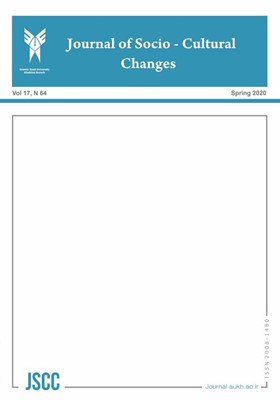The relationship between social, cultural and economic capital and the structure of power distribution in the family
Subject Areas : Family
rogaye velayati
1
![]() ,
Davood Ebrahimpoor
2
*
,
Davood Ebrahimpoor
2
*
![]() ,
mohamadbager alizadeagdam
3
,
mohamad abaszadeh
4
,
mohamadbager alizadeagdam
3
,
mohamad abaszadeh
4
![]()
1 - Student of Islamic Azad University of TabrizPhD Student in Sociology, Tabriz Branch, Islamic Azad University, Tabriz, Iran.
2 - Assistant Professor, Department of Sociology, Tabriz Branch, Islamic Azad University, Tabriz, Iran.
3 - Professor, Department of Sociology, Tabriz Branch, Islamic Azad University, Tabriz, Iran.
4 - Professor, Department of Sociology, Tabriz Branch, Islamic Azad University, Tabriz, Iran.
Keywords: Economic, Capital, Social, Cultural, family power distribution,
Abstract :
The purpose of this study is to investigate the effect of social, cultural and economic capital on the structure of power distribution in the family. The research is of applied and survey type.the statistical population is the students of the Islamic Azad University of Tabriz. The method of collection was a questionnaire with content and face validity and its reliability was obtained with Cronbach's alpha. Theoretical foundations: "Bourdieu's theory, Putnam, resource theory, etc." Spss18 and Amos were used to analyze the data. The results showed that between economic capital and the dimensions of social capital, the embodied dimension of cultural capital has a direct relationship with the power distribution structure in the family. The results of stepwise multiple regression analysis showed that economic capital, dimensions of social capital and the embodied dimension of cultural capital remained as influential variables in the model. The research variables explain 12% of the power distribution structure in the family and 88% of the variance can be explained by variables outside the research subject. There was no significant relationship between (age, marital status, education) and the power distribution structure in the family. And the power structure in female student families is more democratic than male.
_||_

